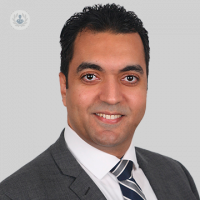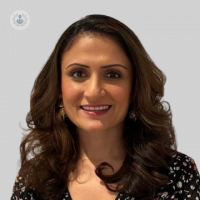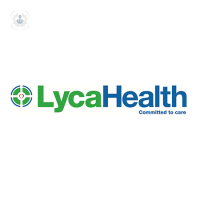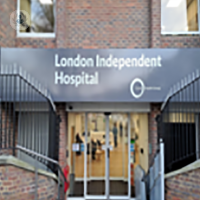What is an eye examination?
An eye examination is a series of tests which are usually conducted by an ophthalmologist (eye doctor), or other professionals such as optometrists. There are different types of eye examination to assess different parts of people's vision, and it is recommended that all people should have periodic eye examinations to check eye health and detect any potential abnormality or disease.
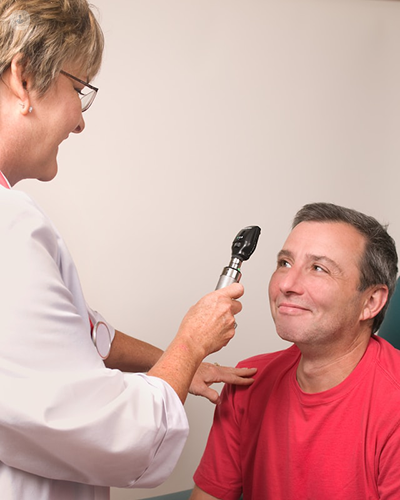
What should I expect during an eye examination?
If you go in for an eye exam, you can usually expect these basic steps:
- Giving a medical history and describing any problems in vision, if applicable
- Having your visual acuity (sharpness, acuteness) measured to check if glasses or contact lenses may be needed
- Having your eye pressure measured
- Getting your eye health checked, using lights shone in particular places on the eye to examine both the front and the inside
Other tests may be performed during the examination, such as the reading of an eye chart, a cover test to check the alignment of the eyes, or an examination of the retina. Your ophthalmologist will advise the tests they wish to perform, and explain the steps as they perform them. After the examination they will explain what they have found, and answer any questions you may have.
How can I prepare for an eye examination?
If you wear contact lenses or glasses, make sure to take them with you when you go to the appointment, so the doctor can check if your prescription is accurate. Depending on the type of test performed, you may wish to arrange for someone to take you home afterwards, as certain tests can cause a little discomfort or blur vision. Other tests dilate the eyes, so you may want to have sunglasses at the ready, as bright lights can be uncomfortable after this type of exam.
Why is an eye examination performed?
Eye examinations should be performed regularly as part of routine health checks. This means the doctor or professional can see differences in your eyesight, check for any abnormalities, and correct any vision problems. A healthy adult with no vision problems should expect to have eye tests every five to ten years whilst in their twenties and thirties, every two to four years from age forty to fifty-four, every one to three years from age fifty-five to sixty-four, and every one to two years after the age of sixty-five.
If you already wear glasses or contact lenses, this means you should have your eyes tested more frequently. You also may need more frequent eye tests if there is a history of eye disease in your family, or if you suffer from a chronic illness or disease which puts you at greater risk of developing some kind of eye disease (such as diabetes).
02-28-2017 04-13-2023Eye examination
Dr Nick Koutroumanos - Ophthalmology
Created on: 02-28-2017
Updated on: 04-13-2023
Edited by: Sophie Kennedy
What is an eye examination?
An eye examination is a series of tests which are usually conducted by an ophthalmologist (eye doctor), or other professionals such as optometrists. There are different types of eye examination to assess different parts of people's vision, and it is recommended that all people should have periodic eye examinations to check eye health and detect any potential abnormality or disease.

What should I expect during an eye examination?
If you go in for an eye exam, you can usually expect these basic steps:
- Giving a medical history and describing any problems in vision, if applicable
- Having your visual acuity (sharpness, acuteness) measured to check if glasses or contact lenses may be needed
- Having your eye pressure measured
- Getting your eye health checked, using lights shone in particular places on the eye to examine both the front and the inside
Other tests may be performed during the examination, such as the reading of an eye chart, a cover test to check the alignment of the eyes, or an examination of the retina. Your ophthalmologist will advise the tests they wish to perform, and explain the steps as they perform them. After the examination they will explain what they have found, and answer any questions you may have.
How can I prepare for an eye examination?
If you wear contact lenses or glasses, make sure to take them with you when you go to the appointment, so the doctor can check if your prescription is accurate. Depending on the type of test performed, you may wish to arrange for someone to take you home afterwards, as certain tests can cause a little discomfort or blur vision. Other tests dilate the eyes, so you may want to have sunglasses at the ready, as bright lights can be uncomfortable after this type of exam.
Why is an eye examination performed?
Eye examinations should be performed regularly as part of routine health checks. This means the doctor or professional can see differences in your eyesight, check for any abnormalities, and correct any vision problems. A healthy adult with no vision problems should expect to have eye tests every five to ten years whilst in their twenties and thirties, every two to four years from age forty to fifty-four, every one to three years from age fifty-five to sixty-four, and every one to two years after the age of sixty-five.
If you already wear glasses or contact lenses, this means you should have your eyes tested more frequently. You also may need more frequent eye tests if there is a history of eye disease in your family, or if you suffer from a chronic illness or disease which puts you at greater risk of developing some kind of eye disease (such as diabetes).
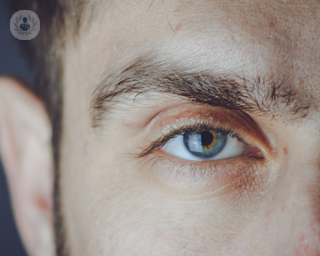

How to resolve eye floaters
By Professor James Bainbridge
2024-11-21
Get the essential facts on eye floaters from Professor James Bainbridge, a leading ophthalmologist. These are generally quite harmless but can sometimes lead to obscured vision. Find out when eye floaters are a cause for concern and discover the treatment options that aim to resolve them. See more


How often should I get my eyes checked?
By Mr CT Pillai
2024-11-21
Depending on whether you’re a newborn baby or you have diabetes, the number of eye examinations you’ll need each year will vary. To break it down for us, we asked Dr CT Pillai how often we need to have an eye test and what we can expect from one. See more
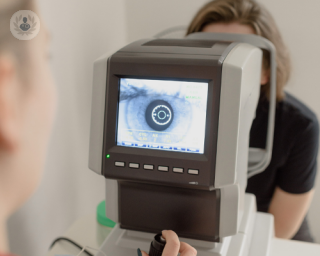

Cornea guttata: What is it and when do their presence indicate eye problems?
By Mr Geraint Williams
2024-11-21
Cornea guttae can potentially lead to significant vision issues such as a significant reduction in vision. Here to provide a detailed and expert explanation about the nature of why they come together to form one mass – and more about the condition, including symptoms - is leading consultant ophthalmologist in Worcester, Hereford and Droitwich Mr Geraint Williams. See more
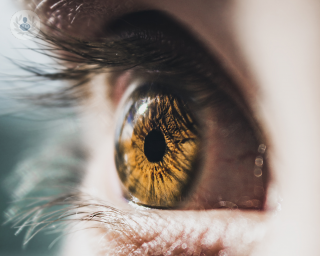

Corneal abrasion: how to treat a scratched eye
By Mr Radwan Almousa
2024-11-21
Patients with a scratched eye make up around 10% of all new visits to the ophthalmic emergency care, and although it’s a minor injury, it can cause significant discomfort. Mr Radwan Almousa, one of our top consultant ophthalmologist based in London walks us through the typical treatment plan you can expect from an ophthalmologist. See more
Experts in Eye examination
-
Mr Mohamed Elalfy
OphthalmologyExpert in:
- Cataracts
- Laser eye surgery
- Dry eye
- Eye examination
- Keratoconus
- YAG laser capsulotomy
-
Dr Jasvir Grewal
OphthalmologyExpert in:
- Oculoplastics
- Cataracts
- Eyelid lump
- Eye examination
- Eyelid cancer
- Glaucoma
-
Ms Minakshi Jain
OptometryExpert in:
- Glaucoma
- Dry eye
- Myopia
- Astigmatism
- Eye examination
- Paediatrics
-
Mr Robert Longhurst
OptometryExpert in:
- Glaucoma
- Dry eye
- Blepharitis
- Meibomian gland dysfunction (MGD)
- Visual stress (Meares-Irlen syndrome)
- Eye examination
-
Mr Dilesh Makwana
OptometryExpert in:
- Eye examination
- Visual stress (Meares-Irlen syndrome)
- Paediatrics
- Dry eye
- Blepharitis
- Eye allergies
- See all

LycaHealth Canary Wharf
LycaHealth Canary Wharf
1 Westferry Circus, Canary Wharf. E14 4HD
No existe teléfono en el centro.
By using the telephone number provided by TOP DOCTORS, you automatically agree to let us use your phone number for statistical and commercial purposes. For further information, read our Privacy Policy
Top Doctors

The Chiltern Hospital - part of Circle Health Group
The Chiltern Hospital - part of Circle Health Group
London Rd, Great Missenden HP16 0EN
No existe teléfono en el centro.
By using the telephone number provided by TOP DOCTORS, you automatically agree to let us use your phone number for statistical and commercial purposes. For further information, read our Privacy Policy
Top Doctors

The London Independent Hospital - part of Circle Health Group
The London Independent Hospital - part of Circle Health Group
1 Beaumont Square, Stepney Green
No existe teléfono en el centro.
By using the telephone number provided by TOP DOCTORS, you automatically agree to let us use your phone number for statistical and commercial purposes. For further information, read our Privacy Policy
Top Doctors
-
LycaHealth Canary Wharf
1 Westferry Circus, Canary Wharf. E14 4HD, Central LondonExpert in:
- Cardiology
- Dermatology
- Diagnostic Imaging
- Women’s health
-
The Chiltern Hospital - part of Circle Health Group
London Rd, Great Missenden HP16 0EN, Great MissendenExpert in:
- Allergies Ophthalmological
- Clinical analysis
- Cancer
- Breast Cancer
- Skin Cancer
- Prostate Cancer
-
The London Independent Hospital - part of Circle Health Group
1 Beaumont Square, Stepney Green, East LondonExpert in:
- Cataracts
- Bariatric Surgery
- Maxillofacial Surgery
- Neurological spinal surgery
- Orthopaedic surgery
- Orthopaedic spinal surgery
- See all
- Most viewed diseases, medical tests, and treatments
- Genetic testing
- Minimal access surgery (keyhole surgery)
- Botulinum toxin (Botox™)
- Orthoptics
- Medicolegal
- Dermal fillers
- Headache
- Strabismus (squint)
- Glaucoma
- Diplopia (double vision)

